Case studies
Ellesmere Port, Cheshire
The neighbourhood
Ellesmere Port Town Ward includes Stanney, Wolverham and the town centre areas. The neighbourhood includes the main retail areas of Ellesmere Port and key institutions such as civic buildings and the Fire Station.
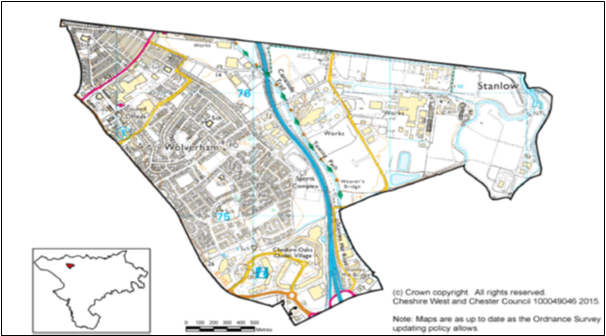
The neighbourhood players
The neighbourhood players
The Local Oversight Group (LOG) comprised a group of local residents and organisations including Ellesmere Port and Neston Association for Voluntary and Community Organisations (EPNAVCO), which served as the COREN organisation and Cheshire West and Chester Council. The COREN organisation also linked with other organisations in the area including for example, Keep Britain Tidy and Cheshire Waste Reduction Volunteers. In the lifetime of the programme, eight local residents joined as Registered Advisers. An estimated 77 residents engaged with activities linked to the NRP.
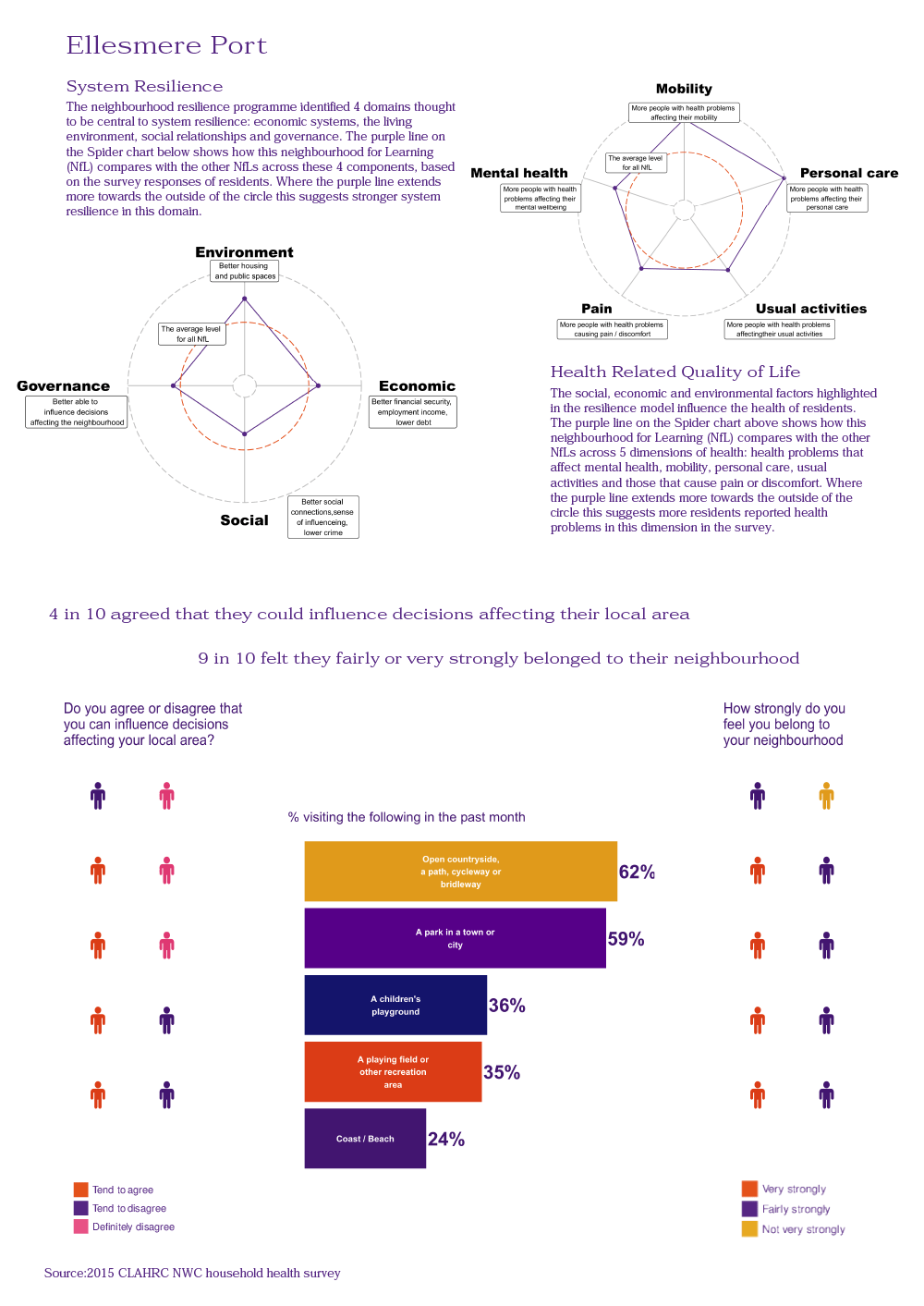
Implementation: enhancing systems resilience
Bringing the system together
Early on, two engagement events were arranged where local residents and other stakeholders were introduced to the CLAHRC NWC Neighbourhood Resilience Programme (NRP).
The first event, held in May 2016, was a screening of the film ‘The Divide’, a documentary on social inequalities based on the book ‘The Spirit Level’ by Richard Wilkinson and Kate Pickett, followed by discussion. It was attended by 25 residents and by representatives of the local authority. The second event, held in August 2016, introduced the NRP. It was attended by ten residents and other local stakeholders including the local Member of Parliament and representatives from the local authority, the police, a local children’s centre, a young carers service and a social hub for older people.
Mobilising knowledge
Surfacing local concerns and suggestions for action for change
Following discussions with residents the focus of the local enquiry was agreed as ‘social space’ and what impact changes to access to and to the quality of social spaces might mean in terms of the four areas of the resilience framework – economic, social, environmental and governance.
A photographic enquiry
In December 2016, we undertook a photography-based (‘photovoice’) enquiry to explore the meaning of place. This included what residents liked about their local area and what might be improved as well as what changes to local spaces and places meant for the people living and working there.
Prior to the enquiry, two preparatory workshops took place to discuss the principles, methods and approaches to the photographic enquiry. The sessions also covered personal safety considerations when undertaking the photographic enquiry in the community; ethical considerations when taking photographs; and fee payments for the work undertaken by Resident Advisers.
As part of the fieldwork, Resident Advisers took photographs of the local area, recorded fieldwork notes and where appropriate, obtained written consent for the use of photographs. Photographic images were explored by Resident Advisers and Academic Leads. Photographs where grouped into themes and suggestions for action for change were identified. Photographs were selected for use in a future community event.
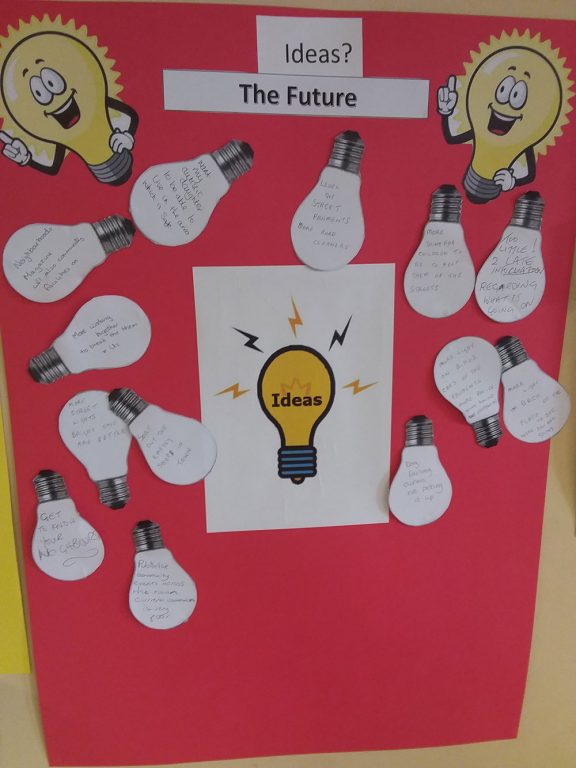
Mobilising knowledge continued and Taking Action
Identifying key priorities collaboratively
A community event was organised, in April 2017, to share the photographs from the enquiry and encourage discussion about suggestions and ideas. Resident Advisers used photo-boards to engage with stakeholders and other residents, exploring what they liked about the local area and what might be improved. A number of local stakeholders and researchers contributed to the event e.g. the local lunch club offered a light lunch, the local authority displayed information about regeneration plans, the local housing association had a stall and researchers demonstrated the Household Health Survey (HHS) database,. All attendees were invited to contribute ideas for action for change.
Issues and ideas for change from the enquiry and the dissemination event were drawn together into themes and presented at the first LOG meeting, held in May 2017. Acting on the neighbourhood environment was recognised as a key theme. Suggestions included improving local facilities for people of all ages to get together, developing more community groups and activities, addressing road safety concerns and improving outside spaces. A second key theme was improving communication across the neighbourhood.
Taking Action
1. Redeveloping the garden of a local community centre
Mobilising local knowledge to inform action
In November 2017, Resident Advisers visited a local community farm to get ideas about developing local land space and to get tips on growing plants, to support work to redevelop a community garden. A preparatory workshop centred on practical and ethical considerations prior to the visit. Hosted by the farm manager, we were shown around the farm and had the opportunity to take notes and photographs. Representatives from Keep Britain Tidy and Cheshire Waste Reduction Volunteers provided advice and produced a plan for the redevelopment of the community centre garden. The new plan was shared with families and groups using the community centre. They were invited to offer their input and to participate in the work. Unfortunately, the redevelopment of the garden of the local community centre was not completed in the lifetime of the NRP in Ellesmere Port.
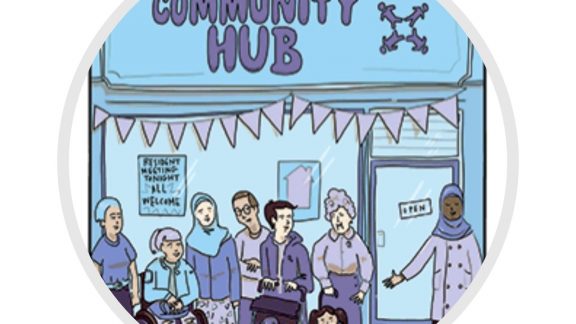
Taking action: 2. Road safety
2. Taking action on road safety
Mobilising local knowledge to inform knowledge
In December 2017, we undertook a safety-mapping enquiry. Resident Advisers, area residents and other stakeholders explored walking routes to schools and potential safety issues using a large map of the area.
Raising the issues
The results were discussed with several local stakeholders and several areas were visited. Several actions were progressed to highlight road safety issues on the route to school and at drop-off and pick-up times. Communication with a local school included the sharing of some current road safety initiatives from Cheshire West And Chester (CWAC) Council at their request.
Issues such as overgrown bushes blocking pathways and safety issues related to green spaces were also discussed with relevant stakeholders.
3. Expansion of local lunch club
A local lunch club, set up with the aim of reducing loneliness and social isolation among older residents, was extended to a second site within the Neighbourhood for Learning following a successful funding application to the Power to Change Bright Ideas Fund for £10,000. The bid was developed by Resident Advisers with support from the COREN organisation. The funding application was in response to the suggestion that there was a lack of opportunity for people to come together socially in the area of the second site. The lunch club was seeking to expand its provision by upgrading its equipment and facilities, serving more people, and developing a funding bid to subsidise travel costs to enable people that would otherwise be unable to get to the club. The club has facilitated the development of friendships and relationships extending beyond the weekly meetings at the lunch club.
The Team
Adele Ring – Academic Lead
Kay Slater – Resident Adviser
Related Content
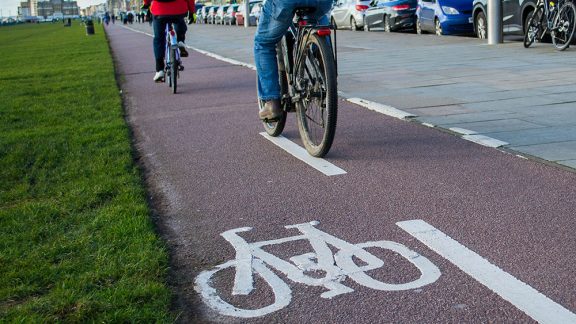
Related content
Lorem ipsum dolor sit amet, consectetur adipiscing elit. Nulla libero elit, viverra eget risus eu, posuere semper lorem. Lorem ipsum dolor sit amet, consectetur adipiscing elit. Nulla libero elit, viverra eget.
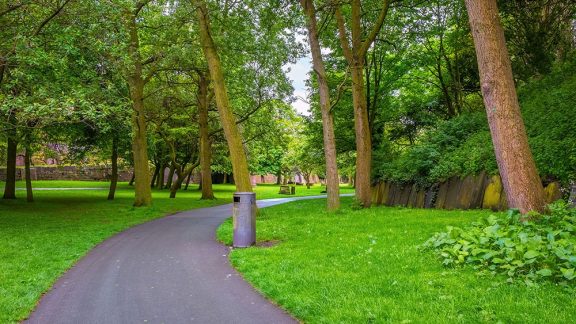
Related content
Lorem ipsum dolor sit amet, consectetur adipiscing elit. Nulla libero elit, viverra eget risus eu, posuere semper lorem. Lorem ipsum dolor sit amet, consectetur adipiscing elit. Nulla libero elit, viverra eget.
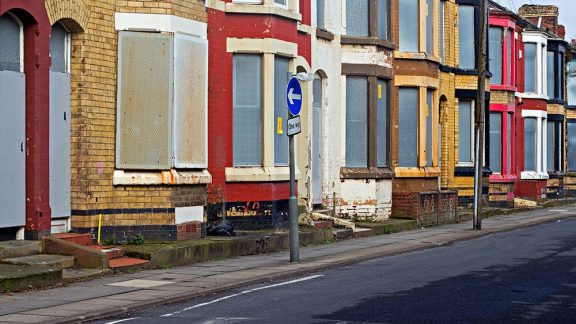
Related content
Lorem ipsum dolor sit amet, consectetur adipiscing elit. Nulla libero elit, viverra eget risus eu, posuere semper lorem. Lorem ipsum dolor sit amet, consectetur adipiscing elit. Nulla libero elit, viverra eget.